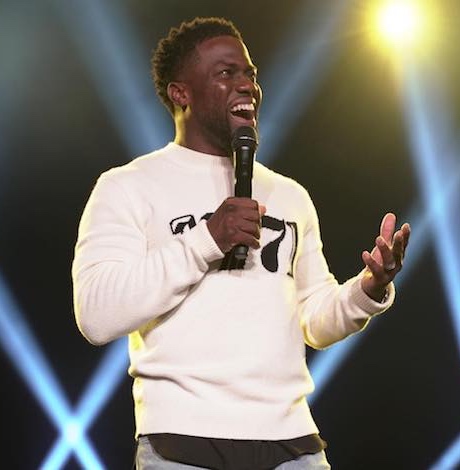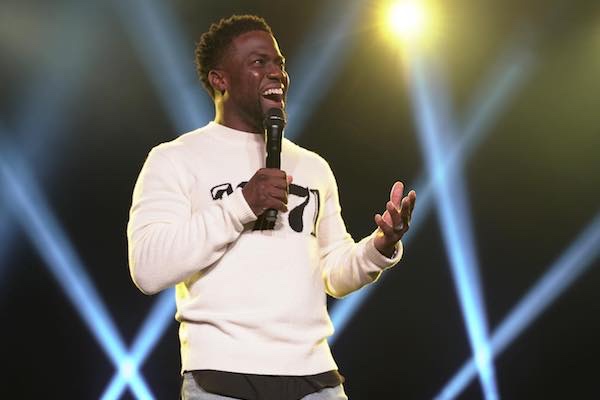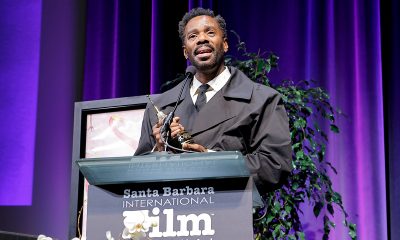Arts & Entertainment
Kevin Hart steps aside as 2019 Oscar host after protests
In the age of #MeToo, a controversial host is toast


Kevin Hart. (Photo Facebook)
UPDATE: Comedian and actor Kevin Hart says he has stepped down from hosting the 2019 Oscars following a controversy over homophobic tweets and comments from his stand up act from as far back as 2009.
Hart said he does not wish to be a distraction and that he is “sorry he had hurt people” after calls for the Academy to drop him went viral.
Hart had said hosting the Oscars was “a goal on my list for a long time.”
On Thursday, Hart initially responded to outcry over his being named by the Academy as host of the ceremony with a video posted on Instagram, in which he said, “Guys, I’m nearly 40 years old. If you don’t believe that people change, grow, evolve as they get older, I don’t know what to tell you. If you want to hold people in a position where they always have to justify the past, do you. I’m the wrong guy, man.”
This was followed later on Thursday evening with another video, in which the comedian told followers the Academy had called him and offered him an ultimatum: apologize for the tweets or step down as host. He refused to apologize, saying he had “addressed this several times. This is not the first time this has come up. I’ve addressed it. I’ve spoken on it.”
Finally, late in the day, Hart announced via Twitter that he had chosen to step down “because I do not want to be a distraction on a night that should be celebrated by so many amazing talented artists.”
“I sincerely apologise to the LGBTQ community for my insensitive words of the past,” he said.
I’m sorry that I hurt people.. I am evolving and want to continue to do so. My goal is to bring people together not tear us apart. Much love & appreciation to the Academy. I hope we can meet again.
— Kevin Hart (@KevinHart4real) December 7, 2018
As its much-criticized (and now recanted) decision to add a “Best Popular Film” category to its awards roster earlier this year clearly revealed, the Oscars are desperate to increase their ever-declining ratings.
Has the Academy Award lost its way? That question is increasingly being asked.
For the broadcast of the Academy Awards’ 90th annual ceremony in 2018, viewership was about 26.5 million people – around 20% lower than the previous year, it was the first time the figure had dropped below 30 million and the lowest number since Nielsen started tracking Oscar ratings in 1974.
The Hart fiasco was born of a reckless effort to boost its relevance and regain audience.
At first glance, it seemed like the perfect solution to their problem. Hart is immensely popular, performing to sell-out crowds in huge venues like the 69,000-seat Lincoln Financial Field in his hometown of Philadelphia. He topped Forbes’ 2016 list of the highest-paid comedians, and he’s proven his appeal to movie crowds with box-office hits, like this year’s “Night School” and “Jumanji: Welcome to the Jungle.”
His films have grossed $3.5 billion worldwide, and his social media presence (35 million followers on Twitter, 65 million on Instagram) is impressive. The chance to see what he does as an Oscar host obviously had the potential to draw a lot of viewers that wouldn’t normally tune in.
In addition, Hart had been vocal about his desire to host the Oscars for several years now.
It’s a job that has proven thankless for many celebrities who have done it in the past – from Chevy Chase to David Letterman to Seth McFarlane, the ceremony has been fronted by a long list of popular comedians who were deemed to have failed spectacularly, and there’s an even longer list of personalities who have been asked and turned it down (as detailed in a recent piece by the Hollywood Reporter).
But Hart had actively been after the gig since at least 2015, when the Los Angeles Times reported him as saying, “If I can start the campaign now and get them into it, I’m all for it. I would just jump at the opportunity.”
Lastly, as only the fourth African-American person ever to host the ceremony (following Richard Pryor, Chris Rock, and four-time host Whoopi Goldberg), Hart would potentially have helped to smooth over the lingering criticism stemming from the #OscarsSoWhite controversy of two years ago, when the lack of diversity among the Academy’s award nominations – and onstage at its ceremony – underscored the inadequate representation of non-whites within the content produced by the Hollywood film industry. In a year when most of the apparent front-runners seem, yet again, to be white, having a black host might be a way to stave off any resurgence of backlash.
Unfortunately, this solution failed to take into account the messaging it sent on another front.
The Academy – in typically tone-deaf fashion – may have chosen a host who checks off several important boxes for image-conscious Hollywood, but in doing so it ignored Hart’s problematic history of homophobia.
And as you can see from the Instagram post above, Hart is now positioning himself as a victim of PC culture run amok.
It’s not all that different from the notorious comedy routine for his 2010 TV special, “Seriously Funny,” Hart joked that as a parent, “one of my biggest fears is my son growing up and being gay.” After quickly adding that he had “nothing against gay people,” he went on to say that “as a heterosexual male, if I can prevent my son from being gay, I will.” He went on to joke that every kid has a “gay moment… but when it happens, you gotta nip it in the bud.”
In a 2015 interview with Rolling Stone, Hart confessed that he “wouldn’t tell the joke today.” His reasons, however, had nothing to do with the obvious anti-gay bias involved; instead, he deflected by saying, “the times weren’t as sensitive as they are now. I think we love to make big deals out of things that aren’t necessarily big deals, because we can. These things become public spectacles. So why set yourself up for failure?”
He also responded in an interview with Parade, by saying, “I had one gay joke in my career and it was about my son at a birthday party, and it was before things got as PC as they are now.”
In other words, his only remorse was over how it affected his image.
Blaming the current #MeToo movement for creating this atmosphere is not a show of remorse. Neither is saying it’s something he’s sorry about while he keeps doing it.
Apparently, that remorse has not been strong enough to keep him from making more homophobic comments. His Twitter feed has been laced with them throughout his career – things like “Yo if my son comes home & try’s 2 play with my daughter’s doll house I’m going 2 break it over his head % say n my voice ‘stop that’s gay.’”
In one particularly offensive tweet, he called out another Twitter user by saying their profile picture looked “like a gay billboard for AIDS.”
He has repeatedly used phrases like “no homo” and “no homo gay,” and lambasted his critics by calling them such names as “f*g boy,” “gay face,” “fat faced f*g,” and “man bitch.”
According to an article published by Queerty just this morning, Hart had been deleting many of these posts – most of which had already been re-Tweeted in protest by thousands of Twitter users after news broke of his Oscar gig.
There’s also the matter of his treatment of ex-wife Torrei Hart, to whom he admitted being physically abusive in his 2017 memoir, “I Can’t Make This Up.” He also confessed in a radio interview last year to having cheated on his current wife, Eniko Parrish, just a few months earlier – while she was pregnant.
With LGBTQ-focused films like “Boy Erased” and “Bohemian Rhapsody” predicted to be in the running, as well as “A Star Is Born,” which features gay icon Lady Gaga, this year’s Oscars are shaping up to have a strong queer presence. With this in mind, placing Hart in the center of the proceedings – when his long track record of homophobic remarks was already well-documented and should have been taken into account by the Academy before offering him the job – was always a bad idea.
Whether or not the comedian really believes the homophobic viewpoints he has projected in his comedy – which, for the record, he has repeatedly insisted he does not – his selection as host sent a mixed message from the Academy to its membership and to its millions of avid followers, many of whom are either LGBTQ or allies.
It’s not the first time the organization has faced this issue. In 2011, Brett Ratner was forced to resign as producer of that year’s Oscar ceremony due to his record of homophobic slurs.
As for the Hart debacle, the Academy has yet to issue a statement.

‘A Wrinkle in Time’
Through July 20
Arena Stage
1101 Sixth St., S.W.
Tickets range from $59-$209
Arenastage.org
Currently at Arena Stage, talented out actor and singer Taylor Iman Jones is rekindling an old friendship with an adored character of fiction.
Broadway vet Jones is starring as 13-year-old Meg Murry in “A Wrinkle in Time,” the world-premiere musical adaptation of Madeleine L’Engle’s same-titled book.
For many readers, especially women, the classic 1962 young adult novel, was their first foray into sci-fi, particularly one with a female protagonist.
The story centers on Meg, an awkward schoolgirl whose physicist father has mysteriously disappeared. Now, Meg, her popular friend Calvin, and smart younger brother Charles Wallace are tasked with moving through time and space to find him. Along the way they encounter adventure and evil.
For Jones, 33, playing 13-year-old Meg feels freeing in ways. She says, “As you get older, you’re told to grow up, so I like letting go of some of that. To feel feelings in their rawest form and to tap back into that is fun. I like the spontaneity. There are highs and lows to revisit.”
Born and raised in the San Francisco Bay Area, Jones began piano lessons at just six and soon added band and plays to their pursuits. Following high school, she made a deep dive into California theater for seven years before making the big move to New York in 2017 where after just two months she was singing on Broadway.
The determined and appealing Jones, who lives in New York with their partner, boasts an impressive bio. She has appeared on Broadway as Catherine Parr, Henry VIII’s sixth and final wife in Six, and in the original casts of “Head Over Heels” and “Groundhog Day.” She’s been seen in national tours of “Hamilton” and “American Idiot.”
WASHINGTON BLADE: It seems “A Wrinkle in Time” and Meg mean a lot to a lot of people.
TAYLOR IMAN JONES: The book tells the story of a girl with so much undiscovered power who’s accomplishing things she never imagined that she could.
BLADE: Can you relate?
JONES: Meg wears her emotions on her sleeve. I can certainly relate to that. I’m a Pisces. Sometimes being hyperemotional and very empathetic can feel like a burden, but as I’ve matured, I have realized that it’s not a bad quality. And it’s something I’ve learned to harness and to enjoy. I love that I can play a role like Meg in front of thousands of people.
BLADE: Was “Wrinkle in Time” a book you knew well?
JONES: Oh yeah, it’s a favorite book that lives in my heart and my mind. It’s one of the first books that taught me about the adventure of reading.
BLADE: And playing a favorite character must be a kick.
JONES: It really is.
BLADE: Meg is a big part in a big show.
JONES: This musical is huge. They’re traveling through space and meeting people on different planets. 20-person cast. 30 songs in the show. Quite the undertaking and I’m proud of us. I’m on stage for the entire musical and I sing four or five numbers.
As a mezzo soprano I guess you’d say I have the luxury of being able to do a lot of musicals that span a lot of different genres: rock musical, pop musical, and standards. “A Wrinkle in Time” is contemporary musical theater.
For me, singing is probably the least difficult part of the show. What’s harder for me is the way Meg experiences trauma; I need to be careful when I’m screaming and yelling.
BLADE: It seems mostly women have been involved in making this production happen (book by Lauren Yee; music and lyrics by Heather Christian; directed by Lee Sunday Evans; and choreography by Ani Taj.)
JONES: It’s true, the director, writer, etc., and most of our producers are all women. This doesn’t happen most of the time. For me it means new ideas and fresh energy, and pushing the limits of musical theater.
It’s also created a wonderful space in which to work. It can be more generous, and understanding. And centering the story on a young girl is something we can all relate to.
BLADE: Will “A Wrinkle in Time” resonate with queer theatergoers and their families?
JONES: I think so, especially on the heels of pride month. It’s truly a show for all ages about finding your inner strength and fighting for the things that you love; not letting evil win over the power of good, and not just for yourself but for those around you too.
Movies
Two new documentaries highlight trans history
‘I’m Your Venus’ on Netflix, ‘Enigma’ on HBO/Max

One of the most telling things about queer history is that so much of it has to be gleaned by reading between the lines.
There are the obvious tentpoles: the activism, the politics, the names and accomplishments of key cultural heroes. Without the stories of lived experience behind them, however, these things are mere information; to connect with these facts on a personal level requires relatable everyday detail — and for most of our past, such things could only be discussed in secret.
In recent decades, thanks to increased societal acceptance, there’s been a new sense of academic “legitimacy” bestowed upon the scholarship of queer history, and much has been illuminated that was once kept in the dark. The once-repressed expressions of our queer ancestors now allow us to see our reflections staring back at us through the centuries, and connect us to them in a way that feels personal.
One of the most effective formats for building that connection, naturally enough, is documentary filmmaking — an assertion illustrated by two new docs, each focused on figures whose lives are intertwined with the evolution of modern trans culture.
“I’m Your Venus,” now streaming on Netfllix, bookends an iconic documentary from the past: “Paris is Burning (1990), Jennie Livingston’s seminal portrait of New York City’s ballroom scene of the ‘80s, In that film, a young trans woman named Venus Xtravaganz delivered first-person confessionals for the camera that instantly won the hearts of audiences — only for them to break with the shattering revelation that she had been murdered before the film’s completion.
That 1988 murder was never solved, but Venus — whose surname was Pellagatti before she joined the House of Xtravaganza – was never forgotten; four decades later, her family (or rather, families) want some answers, and filmmaker Kimberly Reed follows her biological siblings — Joe, Louie, and John, Jr. — as they connect with her ballroom clan in an effort to bring closure to her loss; with the help of trans advocates, they succeed in getting her murder case re-opened, and work to achieve a posthumous legal name change to honor her memory and solidify her legacy.
It’s a remarkably kind and unapologetically sentimental chronicle of events, especially considering the brutal circumstances of Venus’ killing — a brutal death by strangling, almost certainly perpetrated by a transphobic “john” who left her body hidden under a mattress in a seedy hotel — and her decision to leave her birth family for a chosen one. As to the latter, there are no hard feelings among her blood relatives, who assert — mostly convincingly — that they always accepted her for who she was; one senses that a lot of inner growth has contributed to the Pallagatti clan’s mission, which admittedly sometimes resembles an attempt at making amends. For the murder itself, it’s best to leave that part of the story unspoiled — though it’s fair to say that any answers which may or may not have been found are overshadowed by the spirit of love, dignity, and determination that underscore the search for them, however performative some of it might occasionally feel. Ultimately, Venus is still the star of the show, her authentic and unvarnished truth remaining eloquent despite the passage of more than 40 years.
Perhaps more layered and certainly more provocative, documentarian Zackary Drucker’s “Enigma” (now streaming on HBO/Max) delves further back into trans history, tracing the parallel lives of two women — trans pioneer and activist April Ashley and self-styled European “disco queen” Amanda Lear — whose paths to fame both began in Paris of the 1950s, where they were friends and performers together at Le Carrousel, a notorious-and-popular drag cabaret that attracted the glitterati of Europe.
Ashley — who died at 86 in 2021 — was a former merchant seaman from Liverpool whose “underground” success as a drag performer funded a successful gender reassignment surgery and led to a career as a fashion model, as well as her elevation-by-wedding into British high society — though the marriage was annulled after she was publicly outed by a friend, despite her husband’s awareness of her trans identity at the time of their marriage. She went on to become a formidable advocate for trans equality — and for environmental organizations like Greenpeace — who would earn an MBE for her efforts, and wrote an autobiography in which she shared candid stories about her experiences and relationships as part of the “exotic” Parisian scene from which she launched her later life.
The other figure profiled by “Enigma” — and possibly the one to which its title most directly refers — is Amanda Lear, who also (“allegedly”) started her rise to fame at Le Carrousel before embarking on a later career that would include fashion modeling, pop stardom, and a long-term friendship with surrealist painter Salvador Dalí. A self-proclaimed “disco queen” whose success in Europe never quite spread to American culture, despite highly public relationships and collaborations with musical icons like David Bowie and Roxy Music, Lear’s trajectory has taken her in a different direction than Ashley’s. In the film’s extensive live interview segments, she repeatedly denies and discredits suggestions of her trans identity, sticking to a long-maintained script in which any and all details of her origins are obscured and denied as a matter of course.
At times, it’s almost amusing to observe her performative (there’s that word again) denials, which occasionally approach a kind of deliberate “camp” absurdity in their adamance, but there’s also a kind of grudging respect that’s inspired by the sheer doggedness with which she insists on controlling the narrative — however misguided it may seem to those of us on the outside. Debate about her gender-at-birth has continued for decades, even predating Ashley’s book, so the movie’s “revelations” are hardly new, nor even particularly controversial — but her insistence on discrediting them provides sharp contrast with the casual candor of Ashley’s elegantly confident persona, underscoring the different responses to transphobia that would direct the separate lives of both these former (alleged) friends.
For what it’s worth, Lear sent an email to the Washington Post, calling the movie “a pathetic piece of trash” and denying not just her trans identity but any friendship or association with Ashley, despite ample photographic and anecdotal evidence to the contrary — and while it might come across as callous or desperate for her to maintain the presumed façade, it’s a powerful testament to the power of cultural bullying to suppress the truth of queer existence; the contrast between the life each of these women chose to live speaks volumes, and makes “Enigma” into one of the most interesting — and truthful — trans documentaries to emerge thus far.
While neither film presents a comprehensive or definitive view of trans experience (is such a thing even possible, really?), both offer a perspective on the past which both honors the truth of queer existence and illustrates the ways in which the stigma imposed by mainstream prejudice can shape our responses to the identity through which the public perceives us.
That makes them both worth your attention, especially when our queer history — and the acknowledgement of trans existence itself — is at risk or being rolled right back up into the closet.
Sports
Trans cyclist’s victory sparks outrage in conservative media
Katheryn Phillips is originally from DC

On the heels of UPenn erasing the record of the first openly transgender NCAA Division I All-American swimmer and the U.S. Supreme Court’s decision to tackle bans on trans student-athletes, right wing media is now all hot and bothered about the latest trans woman who won a cycling championship — even though she competed according to the rules.
On Tuesday, 58-year-old Katheryn Phillips finished first in USA Cycling’s Lyons Masters National Championship race for women aged 55-59, with a time of 1:42:10, according to the official results posted by the organization. The record shows her gender as “F” for female.
One second behind Phillips was Julie Peterson, with a time of 1:42:11 — as were three other cyclists: Mary Beth Grier, Andrea Cherniak-Tyson, and Carolyn Maddox.
Peterson, 57, was so outraged, she told Fox News she refused to stand on the podium in second place next to Phillips. Her story was swiftly shared by the New York Post (also owned by Fox’s parent company News Corp.), the Daily Mail, Breitbart, and other conservative media.
Both Peterson and another competitor are accusing USA Cycling of “hiding” that a transgender woman had registered to race.
“It was hidden from us. Katheryn Phillips, KJ’s name, was not on that list. And I checked it up all the way to the point of closure when we couldn’t register online anymore,” Debbie Milne told Fox.
“If I had known, I wouldn’t have spent thousands of dollars in travel and time off work to come and do a race,” Peterson said. Fox welcomed Milne, 56, who finished seventh on Tuesday, to Fox & Friends Thursday morning.
(Video courtesy of Fox News)
Peterson told Fox she did complain to USA Cycling officials prior to the race. Both Milne and Peterson referred to Phillips as a male, and with “he/him” pronouns.
“To be fair to all humans, if we want to say ‘him’ or ‘her,’ he was born a biological male, that is a fact,” Milne said. “And that is the thing that makes it an unfair advantage. Whatever has happened after that is a whole different topic.”
“I said, ‘I don’t want to race against a man,’ and they quickly scolded me and said ‘Oh, you can’t call him a man,’ and I’m like ‘Well, he is a man,’ so I was quickly scolded and corrected that it is a woman and I don’t even know what to say.”
USA Cycling did not respond to the Washington Blade’s emails requesting comment.
Phillips, who goes by Kate and by “KJ,” is a former rugby player with the D.C. Furries, who stated in the comments of a 2024 article published by Zwift Insider that she was the first out trans athlete in the U.S. to compete under the 2004 International Olympic Committee’s guidelines on trans participation.
“When USA Rugby told me about the IOC decision in 2004, I raised my hand to be included. I experience nothing but joy when I play, ride, and race,” Phillips said.
As the Blade has reported, the International Olympic Committee drastically revised those rules in 2021, and in March, Republican lawmakers in D.C. demanded the IOC ban trans female athletes from women’s sporting events altogether.
The Blade also reached out to Phillips for comment but as of press time we have not received a response. She told Zwift Insider in March 2024 she does not let those who disapprove or spread hate impact her performance or her attitude.
“I am unaffected by dissent. I love, I share joy, I am me, and I have been my authentic self for decades,” she said. It’s been reported Phillips came out in 1999, and told Zwift Insider she considers herself a lifelong cyclist.
“I’ve been on a bike for as long as I can remember,” said Phillips. “As kids, my friends and I rode all over town, we were feral kids; no cell phones, no trackers … we just roamed, and nobody got in trouble or hurt bad enough not to ride home … Scrapes/bruises/cuts were not an issue for us. In my teens, I worked for myself as a court/legal messenger, doing all of the work via my bike until I got a car. Raced BMX as a kiddo (when I mowed lawns to cover the race entry fees), I did MTB stuff (non-racing) and Sprint/Olympic Triathlons in my 30’s, and now I’m racing on Zwift, Road/Gravel, and CX in my 50s.”
In the comments section, Phillips made clear she’s not competing to win.
“I don’t do sports for victory, I do it because like many other women, I am an athlete to my core,” she said. “Unlike some, I am not there to WIN, I am there to do my best with the competitors and teammates I have around me trying to do the same…we are in it for the experience. I rejoice in their wins, and a lot of joy is reflected back to me when I have a good day.”
-

 U.S. Supreme Court2 days ago
U.S. Supreme Court2 days agoSupreme Court to consider bans on trans athletes in school sports
-

 Out & About2 days ago
Out & About2 days agoCelebrate the Fourth of July the gay way!
-

 Maryland5 days ago
Maryland5 days agoSilver Spring holds annual Pride In The Plaza
-

 Opinions5 days ago
Opinions5 days agoSupreme Court decision on opt outs for LGBTQ books in classrooms will likely accelerate censorship












